Yun Luo
P1: Mastering Physics Olympiads with Reinforcement Learning
Nov 17, 2025Abstract:Recent progress in large language models (LLMs) has moved the frontier from puzzle-solving to science-grade reasoning-the kind needed to tackle problems whose answers must stand against nature, not merely fit a rubric. Physics is the sharpest test of this shift, which binds symbols to reality in a fundamental way, serving as the cornerstone of most modern technologies. In this work, we manage to advance physics research by developing large language models with exceptional physics reasoning capabilities, especially excel at solving Olympiad-level physics problems. We introduce P1, a family of open-source physics reasoning models trained entirely through reinforcement learning (RL). Among them, P1-235B-A22B is the first open-source model with Gold-medal performance at the latest International Physics Olympiad (IPhO 2025), and wins 12 gold medals out of 13 international/regional physics competitions in 2024/2025. P1-30B-A3B also surpasses almost all other open-source models on IPhO 2025, getting a silver medal. Further equipped with an agentic framework PhysicsMinions, P1-235B-A22B+PhysicsMinions achieves overall No.1 on IPhO 2025, and obtains the highest average score over the 13 physics competitions. Besides physics, P1 models also present great performance on other reasoning tasks like math and coding, showing the great generalibility of P1 series.
HiPhO: How Far Are (M)LLMs from Humans in the Latest High School Physics Olympiad Benchmark?
Sep 10, 2025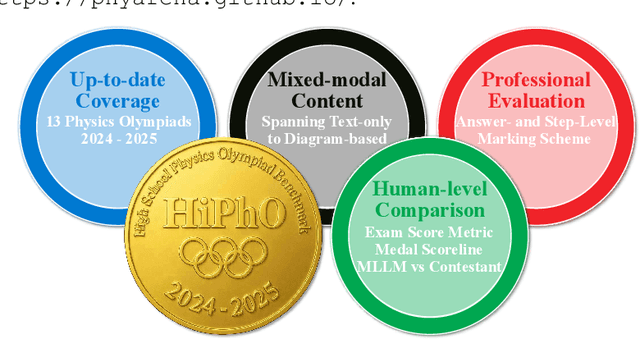

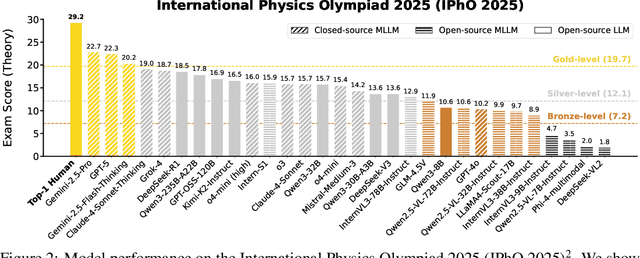

Abstract:Recently, the physical capabilities of (M)LLMs have garnered increasing attention. However, existing benchmarks for physics suffer from two major gaps: they neither provide systematic and up-to-date coverage of real-world physics competitions such as physics Olympiads, nor enable direct performance comparison with humans. To bridge these gaps, we present HiPhO, the first benchmark dedicated to high school physics Olympiads with human-aligned evaluation. Specifically, HiPhO highlights three key innovations. (1) Comprehensive Data: It compiles 13 latest Olympiad exams from 2024-2025, spanning both international and regional competitions, and covering mixed modalities that encompass problems spanning text-only to diagram-based. (2) Professional Evaluation: We adopt official marking schemes to perform fine-grained grading at both the answer and step level, fully aligned with human examiners to ensure high-quality and domain-specific evaluation. (3) Comparison with Human Contestants: We assign gold, silver, and bronze medals to models based on official medal thresholds, thereby enabling direct comparison between (M)LLMs and human contestants. Our large-scale evaluation of 30 state-of-the-art (M)LLMs shows that: across 13 exams, open-source MLLMs mostly remain at or below the bronze level; open-source LLMs show promising progress with occasional golds; closed-source reasoning MLLMs can achieve 6 to 12 gold medals; and most models still have a significant gap from full marks. These results highlight a substantial performance gap between open-source models and top students, the strong physical reasoning capabilities of closed-source reasoning models, and the fact that there is still significant room for improvement. HiPhO, as a rigorous, human-aligned, and Olympiad-focused benchmark for advancing multimodal physical reasoning, is open-source and available at https://github.com/SciYu/HiPhO.
Synthesizing Sheet Music Problems for Evaluation and Reinforcement Learning
Sep 04, 2025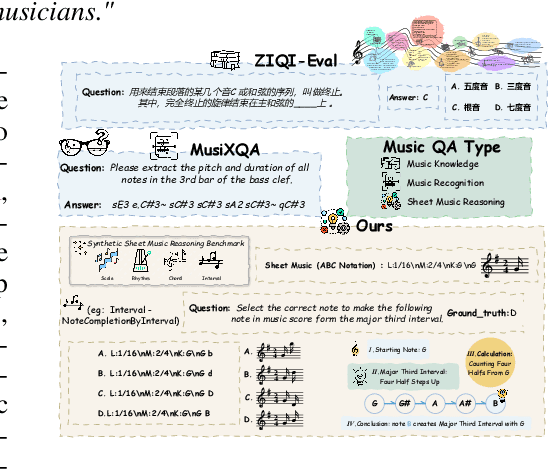

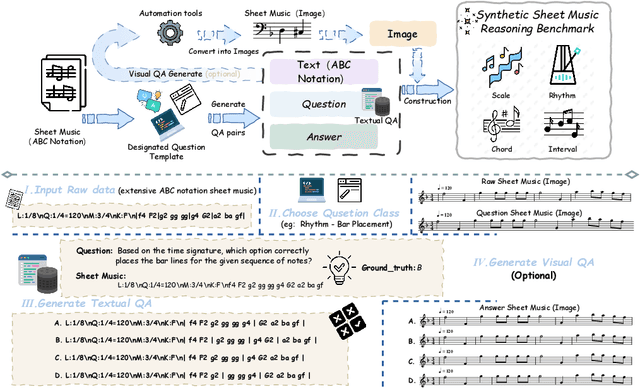
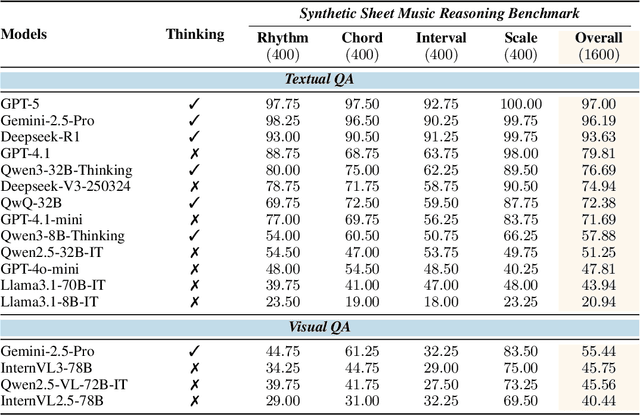
Abstract:Enhancing the ability of Large Language Models (LLMs) and Multimodal Large Language Models (MLLMs) to interpret sheet music is a crucial step toward building AI musicians. However, current research lacks both evaluation benchmarks and training data for sheet music reasoning. To address this, we propose the idea of synthesizing sheet music problems grounded in music theory, which can serve both as evaluation benchmarks and as training data for reinforcement learning with verifiable rewards (RLVR). We introduce a data synthesis framework that generates verifiable sheet music questions in both textual and visual modalities, leading to the Synthetic Sheet Music Reasoning Benchmark (SSMR-Bench) and a complementary training set. Evaluation results on SSMR-Bench show the importance of models' reasoning abilities in interpreting sheet music. At the same time, the poor performance of Gemini 2.5-Pro highlights the challenges that MLLMs still face in interpreting sheet music in a visual format. By leveraging synthetic data for RLVR, Qwen3-8B-Base and Qwen2.5-VL-Instruct achieve improvements on the SSMR-Bench. Besides, the trained Qwen3-8B-Base surpasses GPT-4 in overall performance on MusicTheoryBench and achieves reasoning performance comparable to GPT-4 with the strategies of Role play and Chain-of-Thought. Notably, its performance on math problems also improves relative to the original Qwen3-8B-Base. Furthermore, our results show that the enhanced reasoning ability can also facilitate music composition. In conclusion, we are the first to propose the idea of synthesizing sheet music problems based on music theory rules, and demonstrate its effectiveness not only in advancing model reasoning for sheet music understanding but also in unlocking new possibilities for AI-assisted music creation.
RefuteBench 2.0 -- Agentic Benchmark for Dynamic Evaluation of LLM Responses to Refutation Instruction
Feb 25, 2025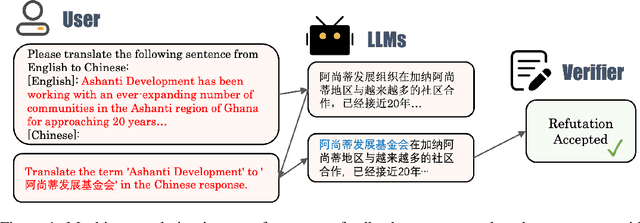

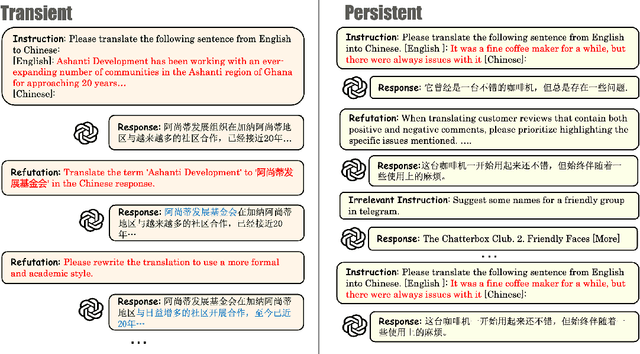

Abstract:In the multi-turn interaction schema, large language models (LLMs) can leverage user feedback to enhance the quality and relevance of their responses. However, evaluating an LLM's ability to incorporate user refutation feedback is crucial yet challenging. In this study, we introduce RefuteBench 2.0, which significantly extends the original RefuteBench by incorporating LLM agents as refuters and evaluators, which allows for flexible and comprehensive assessment. We design both transient and persistent refutation instructions with different validity periods. Meta-evaluation shows that the LLM-based refuter could generate more human-like refutations and the evaluators could assign scores with high correlation with humans. Experimental results of various LLMs show that current models could effectively satisfy the refutation but fail to memorize the refutation information. Interestingly, we also observe that the performance of the initial task decreases as the refutations increase. Analysis of the attention scores further shows a potential weakness of current LLMs: they struggle to retain and correctly use previous information during long context dialogues. https://github.com/ElliottYan/RefuteBench-2.0
PerSphere: A Comprehensive Framework for Multi-Faceted Perspective Retrieval and Summarization
Dec 17, 2024



Abstract:As online platforms and recommendation algorithms evolve, people are increasingly trapped in echo chambers, leading to biased understandings of various issues. To combat this issue, we have introduced PerSphere, a benchmark designed to facilitate multi-faceted perspective retrieval and summarization, thus breaking free from these information silos. For each query within PerSphere, there are two opposing claims, each supported by distinct, non-overlapping perspectives drawn from one or more documents. Our goal is to accurately summarize these documents, aligning the summaries with the respective claims and their underlying perspectives. This task is structured as a two-step end-to-end pipeline that includes comprehensive document retrieval and multi-faceted summarization. Furthermore, we propose a set of metrics to evaluate the comprehensiveness of the retrieval and summarization content. Experimental results on various counterparts for the pipeline show that recent models struggle with such a complex task. Analysis shows that the main challenge lies in long context and perspective extraction, and we propose a simple but effective multi-agent summarization system, offering a promising solution to enhance performance on PerSphere.
Task Calibration: Calibrating Large Language Models on Inference Tasks
Oct 24, 2024Abstract:Large language models (LLMs) have exhibited impressive zero-shot performance on inference tasks. However, LLMs may suffer from spurious correlations between input texts and output labels, which limits LLMs' ability to reason based purely on general language understanding. In other words, LLMs may make predictions primarily based on premise or hypothesis, rather than both components. To address this problem that may lead to unexpected performance degradation, we propose task calibration (TC), a zero-shot and inference-only calibration method inspired by mutual information which recovers LLM performance through task reformulation. TC encourages LLMs to reason based on both premise and hypothesis, while mitigating the models' over-reliance on individual premise or hypothesis for inference. Experimental results show that TC achieves a substantial improvement on 13 inference tasks in the zero-shot setup. We further validate the effectiveness of TC in few-shot setups and various natural language understanding tasks. Further analysis indicates that TC is also robust to prompt templates and has the potential to be integrated with other calibration methods.
Keys to Robust Edits: from Theoretical Insights to Practical Advances
Oct 12, 2024Abstract:Large language models (LLMs) have revolutionized knowledge storage and retrieval, but face challenges with conflicting and outdated information. Knowledge editing techniques have been proposed to address these issues, yet they struggle with robustness tests involving long contexts, paraphrased subjects, and continuous edits. This work investigates the cause of these failures in locate-and-edit methods, offering theoretical insights into their key-value modeling and deriving mathematical bounds for robust and specific edits, leading to a novel 'group discussion' conceptual model for locate-and-edit methods. Empirical analysis reveals that keys used by current methods fail to meet robustness and specificity requirements. To address this, we propose a Robust Edit Pathway (REP) that disentangles editing keys from LLMs' inner representations. Evaluations on LLaMA2-7B and Mistral-7B using the CounterFact dataset show that REP significantly improves robustness across various metrics, both in-domain and out-of-domain, with minimal trade-offs in success rate and locality. Our findings advance the development of reliable and flexible knowledge updating in LLMs.
OpenResearcher: Unleashing AI for Accelerated Scientific Research
Aug 13, 2024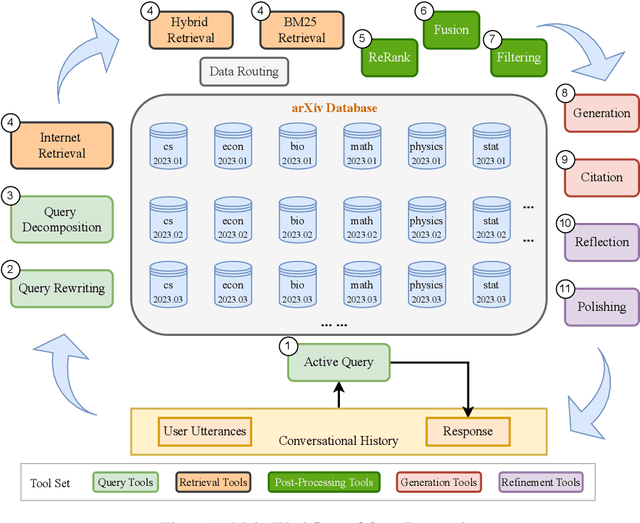

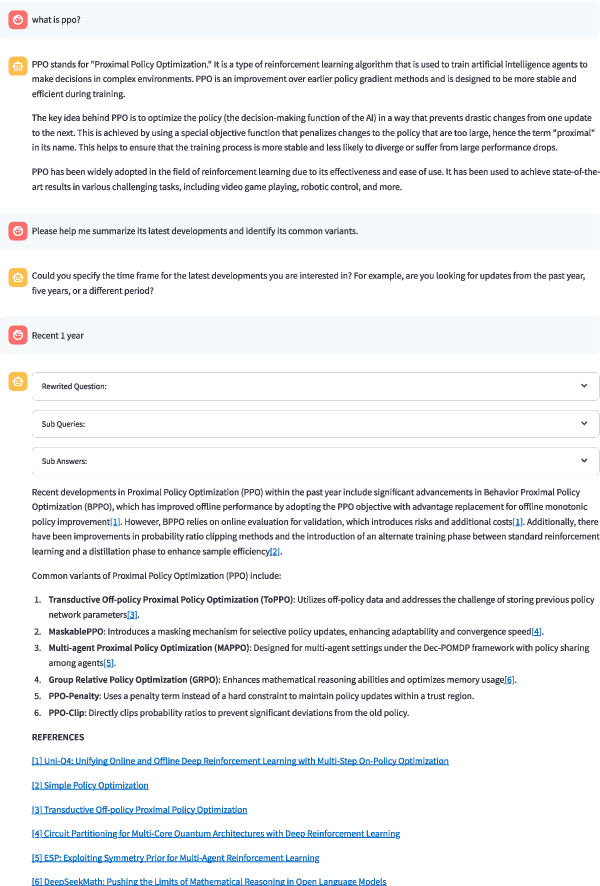
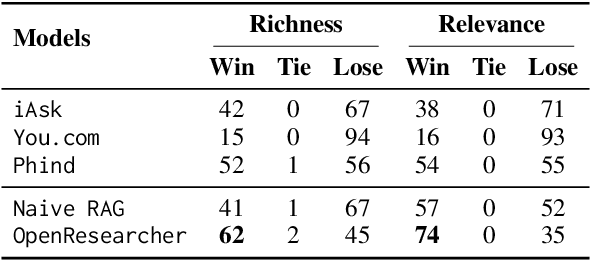
Abstract:The rapid growth of scientific literature imposes significant challenges for researchers endeavoring to stay updated with the latest advancements in their fields and delve into new areas. We introduce OpenResearcher, an innovative platform that leverages Artificial Intelligence (AI) techniques to accelerate the research process by answering diverse questions from researchers. OpenResearcher is built based on Retrieval-Augmented Generation (RAG) to integrate Large Language Models (LLMs) with up-to-date, domain-specific knowledge. Moreover, we develop various tools for OpenResearcher to understand researchers' queries, search from the scientific literature, filter retrieved information, provide accurate and comprehensive answers, and self-refine these answers. OpenResearcher can flexibly use these tools to balance efficiency and effectiveness. As a result, OpenResearcher enables researchers to save time and increase their potential to discover new insights and drive scientific breakthroughs. Demo, video, and code are available at: https://github.com/GAIR-NLP/OpenResearcher.
RefChecker: Reference-based Fine-grained Hallucination Checker and Benchmark for Large Language Models
May 23, 2024



Abstract:Large Language Models (LLMs) have shown impressive capabilities but also a concerning tendency to hallucinate. This paper presents RefChecker, a framework that introduces claim-triplets to represent claims in LLM responses, aiming to detect fine-grained hallucinations. In RefChecker, an extractor generates claim-triplets from a response, which are then evaluated by a checker against a reference. We delineate three task settings: Zero, Noisy and Accurate Context, to reflect various real-world use cases. We curated a benchmark spanning various NLP tasks and annotated 11k claim-triplets from 2.1k responses by seven LLMs. RefChecker supports both proprietary and open-source models as the extractor and checker. Experiments demonstrate that claim-triplets enable superior hallucination detection, compared to other granularities such as response, sentence and sub-sentence level claims. RefChecker outperforms prior methods by 6.8 to 26.1 points on our benchmark and the checking results of RefChecker are strongly aligned with human judgments. This work is open sourced at https://github.com/amazon-science/RefChecker
Generating Diverse Criteria On-the-Fly to Improve Point-wise LLM Rankers
Apr 18, 2024Abstract:The most recent pointwise Large Language Model (LLM) rankers have achieved remarkable ranking results. However, these rankers are hindered by two major drawbacks: (1) they fail to follow a standardized comparison guidance during the ranking process, and (2) they struggle with comprehensive considerations when dealing with complicated passages. To address these shortcomings, we propose to build a ranker that generates ranking scores based on a set of criteria from various perspectives. These criteria are intended to direct each perspective in providing a distinct yet synergistic evaluation. Our research, which examines eight datasets from the BEIR benchmark demonstrates that incorporating this multi-perspective criteria ensemble approach markedly enhanced the performance of pointwise LLM rankers.
 Add to Chrome
Add to Chrome Add to Firefox
Add to Firefox Add to Edge
Add to Edge